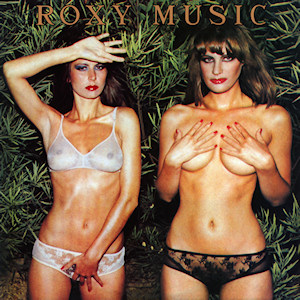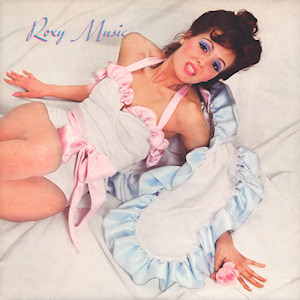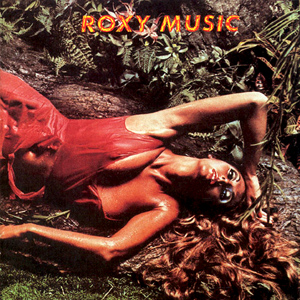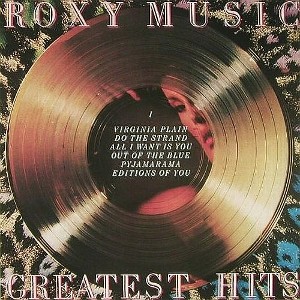
Roxy Music are an English rock band formed in 1970 by lead vocalist and principal songwriter Bryan Ferry and bassist Graham Simpson. By the time the band recorded their first album in 1972, Ferry and Simpson were joined by saxophonist and oboist Andy Mackay, guitarist Phil Manzanera, drummer Paul Thompson and synthesizer player Brian Eno. Other members over the years include keyboardist and violinist Eddie Jobson and bassist John Gustafson. The band split in 1976, reformed in 1978 and split again in 1983. In 2001, Ferry, Mackay, Manzanera and Thompson reunited for a concert tour and have toured together intermittently ever since, most recently in 2022 to celebrate the 50th anniversary of their first album. Ferry has also frequently enlisted band members as backing musicians during his solo career.

Country Life is the fourth studio album by English art rock band Roxy Music, released on 15 November 1974 by Island Records. It was released by Atco Records in the United States. The album is considered by many critics to be among the band's most sophisticated and consistent.

Phillip Geoffrey Targett-Adams, known professionally as Phil Manzanera, is an English musician, songwriter and record producer. He is the lead guitarist with Roxy Music, and was the lead guitarist with 801, and Quiet Sun. In 2006, Manzanera co-produced David Gilmour's album On an Island, and played in Gilmour's band for tours in Europe and North America. He wrote and presented a series of 14 one-hour radio programmes for station Planet Rock entitled The A-Z of Great Guitarists.

For Your Pleasure is the second studio album by the English rock band Roxy Music, released on 23 March 1973 by Island Records. It was their last to feature synthesiser and sound specialist Brian Eno.

Roxy Music is the debut studio album by English rock band Roxy Music, released on 16 June 1972 by Island Records.

Viva! Roxy Music was the first live Roxy Music album. It was released in July 1976 and was recorded at three venues in the United Kingdom between 1973 and 1975. The recordings were from the band's shows at the Glasgow Apollo in November 1973, Newcastle City Hall in October 1974 and the Wembley Empire Pool in October 1975.

Stranded is the third album by English rock band Roxy Music, released in 1973 by Island Records. Stranded was the first Roxy Music album on which Bryan Ferry was not the sole songwriter, with multi-instrumentalist Andy Mackay and guitarist Phil Manzanera also making songwriting contributions. It is also their first album with keyboardist/violinist Eddie Jobson and bassist John Gustafson, who replaced Brian Eno and John Porter, respectively, after their departures following the release of their previous album For Your Pleasure.

Andrew Mackay is an English musician, best known as a founding member of the art rock group Roxy Music.

Let's Stick Together is a 1976 album by Bryan Ferry. His third solo release, it was his first following the disbanding of Roxy Music earlier in the year. Unlike Ferry's two previous solo releases, Let’s Stick Together was not a dedicated album project, instead predominately made up of singles, B-sides, and an EP. Three tracks were exclusive to the LP, all remakes of Roxy Music tracks: "Casanova", "2HB", and "Chance Meeting". It had a generally favourable critical reception, but only just made the UK Top 20.
"If There Is Something" is a song written by Bryan Ferry and recorded by Roxy Music for their eponymous debut album in 1972. A live version appears on their Viva! live album.

"Do the Strand" is the first song from English rock band Roxy Music's second album, For Your Pleasure. In contrast to the songs from Roxy Music's eponymous debut album, this song starts suddenly without any instrumental fanfare.
"Amazona" is the third track from Roxy Music's November 1973 album Stranded. It features a very high pitched guitar solo from Phil Manzanera. The intro features a Bo Diddley beat. The middle section is in 14/4 timing, 4 bars of 3/4 and one of 2/4.

"Love Is the Drug" is a 1975 song from English rock band Roxy Music's fifth studio album Siren, released as a single in September 1975. Co-written by Bryan Ferry and Andy Mackay, the song originated as a slower, dreamier track until the band transformed its arrangement to become more dance-friendly and uptempo. Ferry's lyrics recount a man going out looking for action.

The Best of Roxy Music is a greatest hits album by English art rock band Roxy Music, released in 2001. The album includes at least one song from all eight of the band's studio albums and all three of their non-album single A-sides. The songs are arranged in reverse chronological order.

Greatest Hits is a compilation album by the English band Roxy Music. It was released in 1977, when the band were on hiatus.

Diamond Head is the first studio album by English rock musician Phil Manzanera. It was released in 1975, originally on Island Records in the UK and in the US on Atco Records. The sound quality on the US album was deemed to be worse than the UK album, so the UK import became a popular seller in the speciality record shops who sold Roxy Music and other UK bands. The diesel locomotive featured on the cover art is an EMD E9.

"Pyjamarama" is a song by English rock band Roxy Music, released as a single in March 1973. It reached a peak of number 10 on the UK Singles Chart after a twelve week charting stint. The song was written by Bryan Ferry, and the first one he wrote with the guitar as his instrument. and was backed by an instrumental non-LP track called "The Pride and the Pain" written by Andy Mackay.
"All I Want is You" is a single by English rock band Roxy Music, written by Bryan Ferry, and taken from their 1974 album Country Life. It reached a peak of No. 12 on the UK Official Singles Chart, in an eight-week stint on the charts. The single is also notable for its B-side, an instrumental track called "Your Application's Failed", which is the only track to date written by drummer Paul Thompson. The track was re-released on The Thrill of It All boxset.

"Both Ends Burning" is a single by English rock band Roxy Music taken from their 1975 album Siren. Written by Bryan Ferry, the song features lyrics inspired by the pressure felt by the band to complete the Siren album as well as keep up their touring obligations. Ferry's struggles in writing the lyrics for the song meant that the band largely had to complete the instrumental track without his vocal line.
















